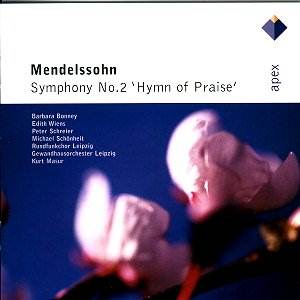This
is a lithe, supple and fleet-of-foot reading of one of Mendelssohnís
lesser known but highly rewarding works. It has been available
before, its last incarnation being Warnerís super-budget Ultima
double pack, where it was coupled with the probably even lesser
known symphonies 1 and 5. It has now been split and reissued,
still at super budget, and demands attention from the collector.
The
piece itself stands in the all-pervading shadow of Beethovenís
Choral Symphony. It starts with what amounts to a 20-minute,
three movement symphony, then has a long final section sub-divided
into choruses and solos from tenor and two sopranos which effectively
form a cantata finale. It does not reach the Beethovenian heights
of grandeur or sublimity, but it does possess many wonderful examples
of Mendelssohnís unforced lyricism, vitality and elegance, and
as such makes for a rewarding listening experience.
Masurís
briskness of tempo is evident from the opening, where his no-nonsense
phrasing immediately sets the tone for a fresh, crisp reading.
This was Mendelssohnís orchestra, and the players are no doubt
aware of their heritage, producing luminous string tone and clean
woodwind textures that are a constant delight. By this stage (the
late 1980s), period practices were beginning to filter into some
mainstream performances, and I feel sure Masur is adopting some
of those features. The main allegro of the opening sinfonia
(as Mendelssohn calls it) is fast and refreshing, never hurried
or clumsy, with the attack from the players giving the music an
inner vitality without losing the charm.
Of
the two sopranos, I found Edith Wiens to be a touch shrill and
strained for my liking, but fortunately the bulk of the solos
are taken by a radiant Barbara Bonney, whose mellifluous phrasing
and sweetness of tone are perfect here. When the two sopranos
join forces, as in ĎI waited for the Lordí (track 9), Wiens softens
her voice a touch and the two become well matched, in fact positively
angelic. Schreier is also a tad strained on some of the higher
tessituras, but his command of the text and intelligent phrasing
more than compensate.
The
choirís contribution is outstanding, with a beautifully homogeneous
tone and athletic response to Masurís brisk speeds. The big, dramatic
fugal chorus ĎThe Night is Departingí (track 11) is particularly
thrilling, and one notices here the contribution of the organ,
which adds notably to the orchestral textures.
The
recording is digital and has good balance and focus. The chorus
at first appears slightly recessed and distant, but one easily
adjusts and it does not mar enjoyment in any way. Soloists are
well caught and the generally warm sound is easy on the ear.
There
are reasonable background notes and full texts and translations,
something to applaud Warner for in this super budget category.
There is also generous cueing of the many individual sections.
Competition is strong, but this is a highly desirable version
of a rewarding piece.
Tony
Haywood
